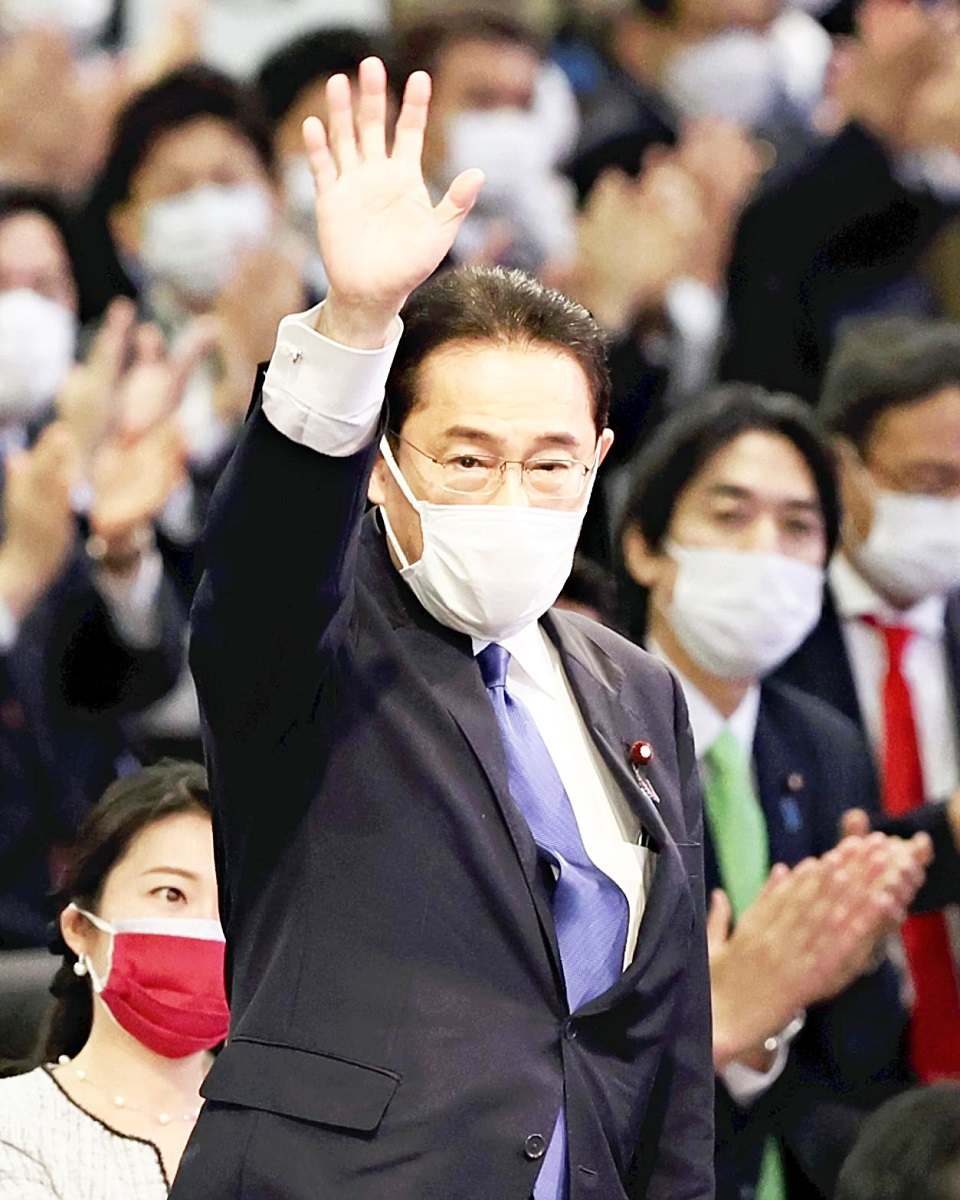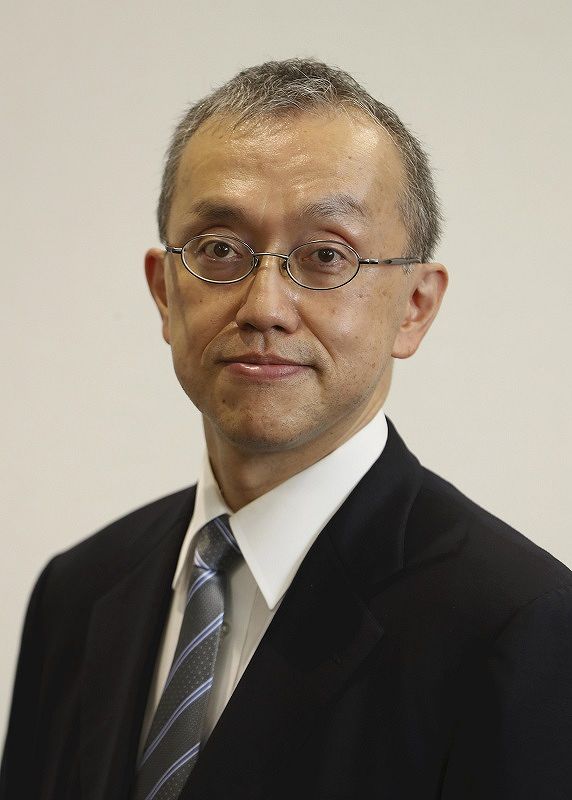
Fumio Kishida waves upon being elected as the new LDP president on Sept. 30, 2021.
8:00 JST, October 7, 2023
It is not too early to look at prospects for the ruling Liberal Democratic Party’s next presidential election, which will be held one year from now. The election must weigh heavily on Prime Minster Fumio Kishida’s mind, as he is the party’s incumbent president and political maneuvering within the LDP has begun.
In the LDP presidential race, candidates will vie for the votes of Diet members and the party’s rank-and-file members. Ballots cast by ordinary party members are important, but not decisive. Experience shows that it has been the leaders of factions or party power brokers in key positions who have influenced lawmakers to decide who wins the presidency.
When Kishida reshuffled Cabinet members and LDP executives last month, he showed his reelection strategy, which was mainly based on factional politics.
You might think that Kishida changed ministers in order to boost the popularity of his administration. But the new Cabinet seems to be rather low-profile, with public opinion polls reflecting its lack of freshness and giving it a low evaluation.
Has Kishida messed up? Yes, in a way, but he must have known that the Cabinet would not gain the people’s confidence. Cementing his political standing inside the LDP took priority over making drastic changes to the Cabinet lineup. So in fact, he is likely content with his allocation of personnel.
His appointment of ministers met almost all of the demands from the major factions. These include the largest, the Abe faction, which had been led by former Prime Minister Shinzo Abe before he was killed last year; the Aso faction, led by LDP Vice President Taro Aso, a former prime minister; and the faction of LDP Secretary General Toshimitsu Motegi. Adding Kishida’s own faction, these groups are the dominant power centers in the party.
If Kishida wants to be reelected for a second term as LDP president, the most desirable way is for him to be supported by these major factions and to have no major competitors seek the seat. That safe scenario currently appears unlikely, but it is not impossible. So, he needs to please these factions not only in selecting his Cabinet ministers but also in his policymaking.
As Abe advocated expansionary fiscal policy when he was in office, it is hard for Kishida — even though his faction has traditionally emphasized balancing the budget — to shift over into expenditure control after COVID-19 relief payments added enormously to the already enormous national debt.
It is the same with revision of the Constitution. Kishida seems to have a neutral stance toward constitutional amendment, but he has no other choice but to tackle it in the near future. One reason why is that revision is a dream that Abe failed to realize and that most of Abe’s faction members continue to wish for.
Excessive concern for appeasing factions will make consensus-building a longer and more difficult challenge. Therefore, the administration will not be able to make quick decisions and may lose policy flexibility. These are just a few examples of the faction-led politics in the LDP. Although Kishida vowed to restore public trust in the party and reform it when he ran in the previous presidential race two years ago, his reelection strategy is old-fashioned. However, this makes sense because the LDP has left the faction system unaddressed.
Another problem is in the LDP bylaws, which stipulate that the president serves a three-year term, and that this cannot be extended beyond three consecutive terms. There are no exceptions. The rule is applied to even an active prime minister. Past prime ministers, most of whom were also the LDP president, prepared for reelection far in advance and devoted much political energy to political infighting. This derives from a long history of factional feuds and frequent transfers of power in the LDP.
The situation of Japan’s ruling party is thought to be unique among democratic countries. In the United Kingdom, the Conservative Party and the Labor Party have no term limits for their leader. Though the German chancellor who heads a party has a two-year term as party leader, they can get a second or third term relatively easily in comparison with Japan. These rules are rational because government affairs should come before party politics.
Contesting the LDP’s leadership race is far from an easy job and past prime ministers have expended huge effort. Since the 1955 establishment of the long-dominant LDP, four prime ministers have stepped down because of losing, or facing hopeless odds in, the presidential election. This number exceeds those who have resigned to take responsibility for the party’s loss in general elections.
Most recently, former Prime Minister Yoshihide Suga gave up on seeking reelection as LDP president after his political plans, such as reshuffling party executives, abruptly dissolving the lower house, and postponing the presidential race, were criticized harshly among party members. Even though his aim was to achieve superiority over his then rival, Kishida, it caused Suga’s reelection strategy to collapse.
Even the longest-serving prime minister, Abe, who had a solid support base within the LDP, was afraid of the tough campaign in the party leadership race. He often flexed his muscles to intimidate his potential rivals.
The burdens of a leadership race and factional strife may be among the reasons there have been so many short-lived administrations in Japan. Such circumstances have overshadowed previous administrations. If this is widely recognized, it raises an obvious question: Why haven’t LDP lawmakers changed their rules and ended this situation?
The answer is that, as a party, they do not need to care about any real adversary. Owing to the low popularity of the two largest opposition parties — the Constitutional Democratic Party of Japan and the Japan Innovation Party — the LDP feels no hesitation over becoming absorbed in internal politics.
Japan has so many challenges, including a labor shortage, a chronically low birth rate and an aging population. But the LDP seems to be too inward-looking and the opposition too unreliable for either side to make a national commitment to seriously tackling these problems and making social and economic systems more sustainable.
Political Pulse appears every Saturday.

Takayuki Tanaka
Takayuki Tanaka is senior managing director, chief officer, administration, of The Yomiuri Shimbun. His previous post was managing editor.
Top Articles in Editorial & Columns
-

Riku-Ryu Pair Wins Gold Medal: Their Strong Bond Leads to Major Comeback Victory
-

China Provoked Takaichi into Risky Move of Dissolving House of Representatives, But It’s a Gamble She Just Might Win
-

University of Tokyo Professor Arrested: Serious Lack of Ethical Sense, Failure of Institutional Governance
-

Policy Measures on Foreign Nationals: How Should Stricter Regulations and Coexistence Be Balanced?
-

Japan’s Plan for Investment in U.S.: Aim for Mutual Development by Ensuring Profitability
JN ACCESS RANKING
-

Japan PM Takaichi’s Cabinet Resigns en Masse
-

Japan Institute to Use Domestic Commercial Optical Lattice Clock to Set Japan Standard Time
-

Israeli Ambassador to Japan Speaks about Japan’s Role in the Reconstruction of Gaza
-

Man Infected with Measles Reportedly Dined at Restaurant in Tokyo Station
-

Videos Plagiarized, Reposted with False Subtitles Claiming ‘Ryukyu Belongs to China’; Anti-China False Information Also Posted in Japan























